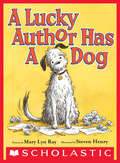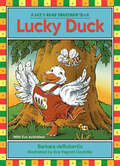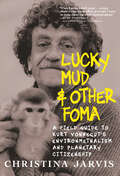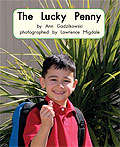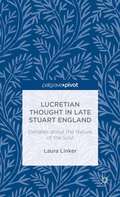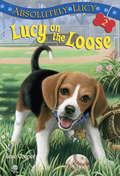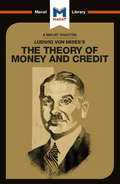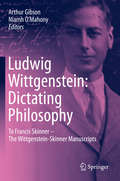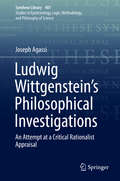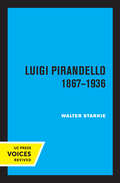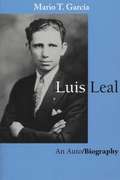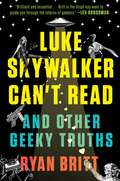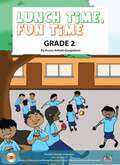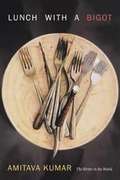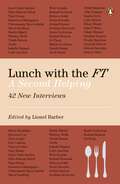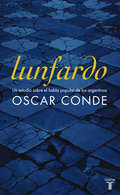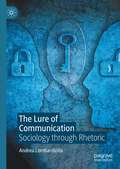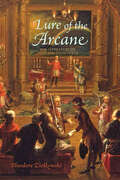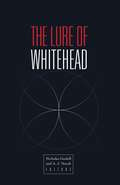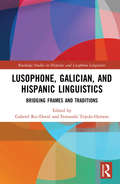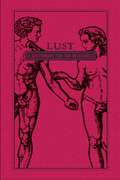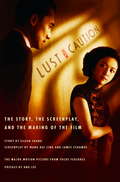- Table View
- List View
A Lucky Author Has a Dog
by Mary Lyn RayFor every aspiring young author out there, this story of a lucky author (and, of course, her dog!) offers both answers and inspiration!Ever wonder what it's like to be an author?Does she write in a quiet corner somewhere? Or someplace loud and busy? Does she have ideas forty times a day? Or does she sometimes get stuck? And how does her dog make her lucky?New York Times bestselling author Mary Lyn Ray, together with illustrations from Steven Henry (Ella the Elegant Elephant) that are chock full of hidden jokes, answers these questions and more in a story of one writer, her furry friend, and a school visit that brings authors young and old (and dogs!) together.
Lucky Duck: Short Vowel U (Let's Read Together ®)
by Barbara deRubertisLet&’s Read Together books merge rhyme and vowel sounds in delightfully zany stories kids will want to read again and again. Each of the 15 books in this classic series by award-winning author/educator Barbara deRubertis will give your child a jumpstart on reading success."Story lines are silly and inventive, and recall Dr. Seuss&’s Cat in the Hat for the building of rhythm and rhyming words." —School Library JournalLucky Duck gets stuck in a muddy puddle. Has this duck ran out of luck? (This easy-to-read story features the short &“u&” vowel sound.)
Lucky Mud & Other Foma: A Field Guide to Kurt Vonnegut's Environmentalism and Planetary Citizenship
by Christina JarvisA fascinating deep dive into Kurt Vonnegut&’s oeuvre and legacy, illuminating his unique perspective on environmental stewardship and our shared connections as humans, Earthlings, and stardust.Vonnegut&’s major apocalyptic trio—Cat&’s Cradle, Slapstick, and Galápagos—prompt broad global, national, and species-level thinking about environmental issues through dramatic and fantastic scenarios. This book, Lucky Mud and Other Foma, tells the story of the origins and legacy of what Kurt Vonnegut understood as &“planetary citizenship&” and explores key roots, influences, literary techniques, and artistic expressions of his interest in environmental activism through his writing. Vonnegut saw writing itself as an act of good citizenship, as a way of &“poisoning&” the minds of young people &“with humanity . . . to encourage them to make a better world.&” Often that literary activism meant addressing real social and environmental problems—polluted water, soil, and air; racial and economic injustice; isolating and dehumanizing technologies; and lives and landscapes desolated by war. Vonnegut&’s remedies took many forms, from the redemptive power of the arts to artificial extended families to vital communities and engaged democracies. Reminding us of our shared connections as humans, as Earthlings, as stardust, Lucky Mud helps fans, scholars, and book lovers of all kinds experience how Vonnegut&’s writings purposely challenge readers to think, create, and love.
The Lucky Penny (Fountas & Pinnell LLI Green #Level G, Lesson 98)
by Ann GadzikowskiFountas and Pinnell Leveled Literacy Intervention Green System -- 1st Grade
Lucretian Thought in Late Stuart England: Debates about the Nature of the Soul
by Laura LinkerHow did writers understand the soul in late seventeenth-century England? This book considers depictions of the soul in literary texts that engage with Lucretius's Epicurean philosophy in De rerum natura or through the writings of the most important natural philosopher to disseminate Epicurean atomism in England, Walter Charleton (1619-1707).
Lucretius
by E. J. KenneyThe De Rerum Natura of Lucretius is a sustained and impassioned protest against religious superstition and irrationality. The poem takes the form of a detailed exposition of Epicurean physical theory - an extreme materialism designed to remove and discredit popular fears of the gods, death and an afterlife. Book III is generally accepted to be the finest in the whole poem; Lucretius argues there that the soul is as mortal as the body and shows that human response to the fact of mortality and death can be at once rational, dignified and liberating. Professor Kenney's commentary is the first to give proper critical emphasis to the techniques and intentions of Lucretius' poetry; it can be read with profit by all students of Latin from senior school level upwards.
Lucy on the Loose
by Ilene CooperWhen Bobby Quinn got a beagle puppy for his eighth birthday, his whole life changed. Lucy helped him forget his shyness and make new friends. But now Lucy's taken off after a fat orange cat, and no one in the neighborhood has seen her anywhere. What will Bobby do if his best friend is gone for good? In this sequel to Absolutely Lucy,Ilene Cooper continues the irresistible story of a boy and his beagle.
Ludwig von Mises's The Theory of Money and Credit (The Macat Library)
by Padraig BeltonLudwig Von Mises’s 1912 contribution to the theory of monetary policy and the current prevailing consensus in modern economic liberalism, The Theory of Money and Credit, was a milestone achievement. The author’s familiarity with the historical literature on banking and credit allows him to present a coherent theoretical structure that links private exchange between individuals, business and banks to condition the markets affecting money and credit. Through its wider influence on liberal thinkers and politicians, the Theory of Money and Credit has become a classic reference for those seeking to understand the advance of economic liberalism since the 20th century.
Ludwig Wittgenstein: To Francis Skinner – The Wittgenstein-Skinner Manuscripts
by Ludwig Wittgenstein Francis SkinnerIn this volume we witness Wittgenstein in the act of composing and experimenting with his new visions in philosophy. The book includes key explanations of the origin and background of these previously unknown manuscripts. It investigates how Wittgenstein’s philosophical thought-processes are revealed in his dictation to, as well as his editing and revision with Francis Skinner, in the latter’s role of amanuensis. The book displays a considerable wealth and variety of Wittgenstein’s fundamental experiments in philosophy across a wide array of subjects that include the mind, pure and applied mathematics, metaphysics, the identities of ordinary and creative language, as well as intractable problems in logic and life. He also periodically engages with the work of Newton, Fermat, Russell and others. The book shows Wittgenstein strongly battling against the limits of understanding and the bewitchment of institutional and linguistic customs. The reader is drawn in by Wittgenstein as he urges us to join him in his struggles to equip us with skills, so that we can embark on devising new pathways beyond confusion. This collection of manuscripts was posted off by Wittgenstein to be considered for publication during World War 2, in October 1941. None of it was published and it remained hidden for over two generations. Upon its rediscovery, Professor Gibson was invited to research, prepare and edit the Archive to appear as this book, encouraged by Trinity College Cambridge and The Mathematical Association. Niamh O’Mahony joined him in co-editing and bringing this book to publication.
Ludwig Wittgenstein’s Philosophical Investigations: An Attempt at a Critical Rationalist Appraisal (Synthese Library #401)
by Joseph AgassiThis book collects 13 papers that explore Wittgenstein's philosophy throughout the different stages of his career. The author writes from the viewpoint of critical rationalism. The tone of his analysis is friendly and appreciative yet critical. Of these papers, seven are on the background to the philosophy of Wittgenstein. Five papers examine different aspects of it: one on the philosophy of young Wittgenstein, one on his transitional period, and the final three on the philosophy of mature Wittgenstein, chiefly his Philosophical Investigations. The last of these papers, which serves as the concluding chapter, concerns the analytical school of philosophy that grew chiefly under its influence. Wittgenstein’s posthumous Philosophical Investigations ignores formal languages while retaining the view of metaphysics as meaningless -- declaring that all languages are metaphysics-free. It was very popular in the middle of the twentieth century. Now it is passé. Wittgenstein had hoped to dissolve all philosophical disputes, yet he generated a new kind of dispute. His claim to have improved the philosophy of life is awkward just because he prevented philosophical discussion from the ability to achieve that: he cut the branch on which he was sitting. This, according to the author, is the most serious critique of Wittgenstein.
Luigi Pirandello, 1867 - 1936, 3rd Edition
by Walter StarkieThis title is part of UC Press's Voices Revived program, which commemorates University of California Press’s mission to seek out and cultivate the brightest minds and give them voice, reach, and impact. Drawing on a backlist dating to 1893, Voices Revived makes high-quality, peer-reviewed scholarship accessible once again using print-on-demand technology. This title was originally published in 1965.
Luis Leal: An Auto/Biography
by Mario T. GarcíaProfessor Luis Leal is one of the most outstanding scholars of Mexican, Latin American, and Chicano literatures and the dean of Mexican American intellectuals in the United States. He was one of the first senior scholars to recognize the viability and importance of Chicano literature, and, through his perceptive literary criticism, helped to legitimize it as a worthy field of study. His contributions to humanistic learning have brought him many honors, including Mexico's Aquila Azteca and the United States' National Humanities Medal.<P><P>In this testimonio or oral history, Luis Leal reflects upon his early life in Mexico, his intellectual formation at Northwestern University and the University of Chicago, and his work and publications as a scholar at the Universities of Illinois and California, Santa Barbara. Through insightful questions, Mario García draws out the connections between literature and history that have been a primary focus of Leal's work. He also elicits Leal's assessment of many of the prominent writers he has known and studied, including Mariano Azuela, William Faulkner, Octavio Paz, Carlos Fuentes, Juan Rulfo, Gabriel García Márquez, Jorge Luis Borges, Tomás Rivera, Rolando Hinojosa, Rudolfo Anaya, Elena Poniatowska, Sandra Cisneros, Richard Rodríguez, and Ana Castillo.
Luke Skywalker Can't Read: And Other Geeky Truths
by Ryan Britt"Ryan Britt is . . . the Virgil you want to guide you through the inferno of geekery." --Lev Grossman, author of the bestselling Magician's trilogy Pop Culture and sci-fi guru Ryan Britt has never met a monster, alien, wizard, or superhero that didn't need further analysis. Essayist Ryan Britt got a sex education from dirty pictures of dinosaurs, made out with Jar-Jar Binks at midnight, and figured out how to kick depression with a Doctor Who Netflix-binge. Alternating between personal anecdote, hilarious insight, and smart analysis, Luke Skywalker Can't Read contends that Barbarella is good for you, that monster movies are just romantic comedies with commitment issues, that Dracula and Sherlock Holmes are total hipsters, and, most shockingly, shows how virtually everyone in the Star Wars universe is functionally illiterate. Romp through time and space, from the circus sideshows of 100 years ago to the Comic Cons of today, from darkest corners of the Galaxy to the comfort of your couch. For anyone who pretended their flashlight was a lightsaber, stood in line for a movie at midnight, or dreamed they were abducted by aliens, Luke Skywalker Can't Read is full of answers to questions you haven't thought to ask, and perfect for readers of Chuck Klosterman, Rob Sheffield, and Ernest Cline.From the Trade Paperback edition.
Lunch Time, Fun Time class 2 - MIE
by Aruna Ankiah Gangadeen"Lunch Time, Fun Time" is a captivating big book designed for Grade 2 English sessions, aiming to enhance literacy skills in young learners. Authored by Dr. Aruna Ankiah-Gangadeen and illustrated by a team, the book features a rhythmic and engaging story reflecting the joyous moments of a school lunch break. It vividly portrays children relishing their meals, engaging in playful activities, sharing stories, and enjoying camaraderie. Through lively illustrations and simple, repetitive text, the book encourages interactive sessions in three stages: pre-reading, reading, and post-reading activities. Teachers are guided to stimulate discussions, encourage predictions, and reinforce comprehension through questions and creative tasks. With its thematic link to Grade 2 English curriculum units, this big book serves as a valuable resource, fostering not only language development but also a deeper interest in English learning among young pupils.
Lunch With a Bigot: The Writer in the World
by Amitava KumarTo be a writer, Amitava Kumar says, is to be an observer. The twenty-six essays in Lunch with a Bigot are Kumar's observations of the world put into words. A mix of memoir, reportage, and criticism, the essays include encounters with writers Salman Rushdie and Arundhati Roy, discussions on the craft of writing, and a portrait of the struggles of a Bollywood actor. The title essay is Kumar's account of his visit to a member of an ultra-right Hindu organization who put him on a hit-list. In these and other essays, Kumar tells a broader story of immigration, change, and a shift to a more globalized existence, all the while demonstrating how he practices being a writer in the world.
Lunch with the FT: A Second Helping
by Lionel BarberLunch with the FT has been a permanent fixture in the Financial Times for almost 30 years, featuring presidents, film stars, musical icons and business leaders from around the world.The column is now a well-established institution, which has reinvigorated the art of conversation in the convivial, intimate environment of a long and boozy lunch.This new and updated edition includes lunches with:Elon MuskDonald TrumpHilary MantelRichard BransonZadie SmithNigel FarageRussell BrandDavid GuettaYanis VaroufakisJean-Claude JunckerGwyneth PaltrowRebecca SolnitJordan PetersonChimamanda Ngozi AdichieAnd more...
Lunfardo
by Oscar CondeEl estudio más completo escrito sobre el habla popular de los argentinos. Oscar Conde ha dividido su ensayo en tres partes: la primera, de naturaleza histórica, analiza las fervorosas discusiones en defensa o descalificación del lunfardo, mayormente relacionadas con la génesis y la verdadera naturaleza de esta habla popular argentina, nacida en la riquísima mezcla inmigratoria del conventillo; la segunda, esencialmente lingüística, se detiene en la conformación del léxico lunfardo a través de préstamos de diversas lenguas, juegos idiomáticos, locuciones, cambios fonéticos y morfológicos; la tercera estudia la productividad del lunfardo en los géneros populares "desde el tango y el sainete hasta el rock", así como su actualidad, con los aportes desde diversas esferas para la conformación y difusión de un fenómeno vital y cargado de futuro. Con amenos ejemplos, a través de precisas comparaciones con formas similares en otras lenguas -el cockney británico, el argot francés, el slang norteamericano, la gíria brasileña, entre otras-, recurriendo a las ciencias del lenguaje, Conde logra circunscribir y definir un fenómeno original que conocemos con el nombre de lunfardo. El texto resulta el estudio más completo escrito hasta la fecha sobre el habla popular de los argentinos o, como prefiere expresarlo Oscar Conde, sobre aquellas "palabras a las que no podemos renunciar".
The Lure of Communication: Sociology through Rhetoric
by Andrea LombardiniloThis book addresses the convergence of sociology, communication and rhetoric, with particular reference to the contemporary expressive and social patterns of mass communication. Using rhetoric as a meta-conceptual apparatus for the sociology of communication, this book offers an original and comprehensive critique of historical social theory alongside 20th century communication researchers. The author demonstrates the symbiotic relationship between the rhetorical structures of the media-sphere and the new narrative formats in which cultural representation merges into social and civil observation. This book will be of interest to academics and students studying sociology, communication and cultural studies.
Lure of the Arcane: The Literature of Cult and Conspiracy
by Theodore ZiolkowskiExplore 2,000 years of conspiracy in fiction.Outstanding Academic Title, ChoiceFascination with the arcane is a driving force in this comprehensive survey of conspiracy fiction. Theodore Ziolkowski traces the evolution of cults, orders, lodges, secret societies, and conspiracies through various literary manifestations—drama, romance, epic, novel, opera—down to the thrillers of the twenty-first century. Lure of the Arcane considers Euripides’s Bacchae, Andreae’s Chymical Wedding, Mozart’s The Magic Flute, and Eco’s Foucault’s Pendulum, among other seminal works. Mimicking the genre’s quest-driven narrative arc, the reader searches for the significance of conspiracy fiction and is rewarded with the author’s cogent reflections in the final chapter. After much investigation, Ziolkowski reinforces Umberto Eco’s notion that the most powerful secret, the magnetic center of conspiracy fiction, is in fact "a secret without content."
Lure of the Arcane: The Literature of Cult and Conspiracy
by Theodore ZiolkowskiA study of the depiction of cults, conspiracies, and secret societies in literature from ancient Greek and Roman mysteries to the 21st century thriller.Fascination with the arcane is a driving force in this comprehensive survey of conspiracy fiction. Theodore Ziolkowski traces the evolution of cults, orders, lodges, secret societies, and conspiracies through various literary manifestations—drama, romance, epic, novel, opera—down to the thrillers of the twenty-first century.Lure of the Arcane considers Euripides’s Bacchae, Andreae’s Chymical Wedding, Mozart’s The Magic Flute, and Eco’s Foucault’s Pendulum, among other seminal works. Mimicking the genre’s quest-driven narrative arc, the reader searches for the significance of conspiracy fiction and is rewarded with the author’s cogent reflections in the final chapter. After much investigation, Ziolkowski reinforces Umberto Eco’s notion that the most powerful secret, the magnetic center of conspiracy fiction, is in fact “a secret without content.”“Conspiracies, whether attributed to mystery cults, Freemasons, Socialists, or Rosicrucians, pervade literature from Euripides to Umberto Eco, as Theodore Ziolkowski shows in Lure of the Arcane. Ziolkowski has read everything, taking even a 3,000-page German novel in his stride, and summarizes and analyses his material fascinatingly for lesser mortals.” —Times Literary Supplement (UK)“Ziolkowski is excellently placed to attempt the construction of a genre history . . . As such, his treatment of the literature and the array of texts included is predictably masterful, moving with ease from Greek and Roman mysteries in antiquity to the Medieval representations of the Knights Templar, through the Rosicrucian manifestoes and the German Enlightenment lodge novels, to the literary depictions of secret societies of Romantic Socialism.” —Nova Religio
The Lure of Whitehead
by Nicholas Gaskill A. J. NocekOnce largely ignored, the speculative philosophy of Alfred North Whitehead has assumed a new prominence in contemporary theory across the humanities and social sciences. Philosophers and artists, literary critics and social theorists, anthropologists and computer scientists have all embraced Whitehead's thought, extending it through inquiries into the nature of life, the problem of consciousness, and the ontology of objects, as well as into experiments in education and digital media.The Lure of Whitehead offers readers not only a comprehensive introduction to Whitehead's philosophy but also a demonstration of how his work advances our emerging understanding of life in the posthuman epoch. Contributors: Jeffrey A. Bell, Southeastern Louisiana U; Nathan Brown, U of California, Davis; Peter Canning; Didier Debaise, Free U of Brussels; Roland Faber, Claremont Lincoln U; Michael Halewood, U of Essex; Graham Harman, American U in Cairo; Bruno Latour, Sciences Po Paris; Erin Manning, Concordia U, Montreal; Steven Meyer, Washington U; Luciana Parisi, U of London; Keith Robinson, U of Arkansas at Little Rock; Isabelle Stengers, Free U of Brussels; James Williams, U of Dundee.
Lusophone, Galician, and Hispanic Linguistics: Bridging Frames and Traditions (Routledge Studies in Hispanic and Lusophone Linguistics)
by Gabriel Rei-Doval Fernando Tejedo-HerreroLusophone, Galician, and Hispanic Linguistics: Bridging Frames and Traditions examines the existing historiographic, foundational and methodological issues surrounding Lusophone, Galician, and Hispanic linguistics The volume offers a balanced collection of original research from synchronic and diachronic perspectives. It provides a first step to assessing the present and future state of Lusophone, Galician, and Hispanic linguistics and argues for an inclusive approach to the study of these three traditions which would enhance our understanding of each. Presenting the latest research in the field, this volume is a valuable resource for scholars in Lusophone, Galician, and Hispanic linguistics.
Lust: A Dictionary for the Insatiable
by Media AdamsThe Seven Deadly Sins have sliced up the dictionary and taken what's theirs. No one vice is too greedy as each volume prides itself on having more than 500 entries. Word lovers will lust after these richly packaged volumes--and once you've collected all seven, you'll be the envy of all your friends.Lust: A Dictionary for the InsatiableOnce just isn't enough. You'll want to ogle these entries multiple times, all night long. Nouns, verbs, adverbs, adjectives, whatever their particular pleasure--or pleasures--they'll find 'em inside.
Lust, Caution
by Eileen Chang Wang Hui LingNow a major motion picture from Oscar-winning director Ang Lee (Crouching Tiger, Hidden Dragon, Brokeback Mountain): an intensely passionate story of love and espionage, set in Shanghai during World War II.In the midst of the Japanese occupation of China and Hong Kong, two lives become intertwined: Wong Chia Chi, a young student active in the resistance, and Mr. Yee, a powerful political figure who works for the Japanese occupational government. As these two move deftly between Shanghai's tea parties and secret interrogations, they become embroiled in the complicated politics of wartime -- and in a mutual attraction that may be more than what they expected. Written in lush, lavish prose, and with the tension of a political thriller, Lust, Caution brings 1940s Shanghai artfully to life even as it limns the erotic pulse of a doomed love affair.From the Trade Paperback edition.
